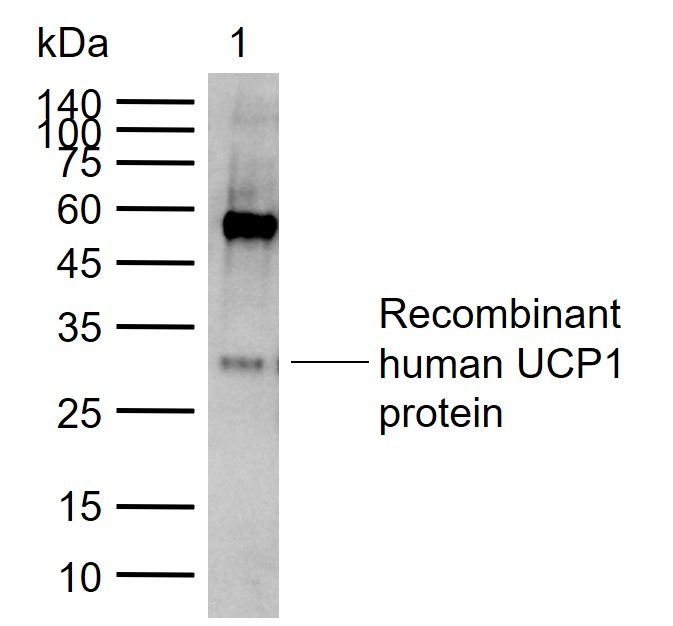Shopping Cart
Remove All Your shopping cart is currently empty
Your shopping cart is currently empty
Anti-UCP1 Polyclonal Antibody is a Rabbit antibody targeting UCP1. Anti-UCP1 Polyclonal Antibody can be used in WB.
| Pack Size | Price | USA Warehouse | Global Warehouse | Quantity |
|---|---|---|---|---|
| 50 μL | $222 | 7-10 days | 7-10 days | |
| 100 μL | $373 | 7-10 days | 7-10 days | |
| 200 μL | $529 | 7-10 days | 7-10 days |
| Description | Anti-UCP1 Polyclonal Antibody is a Rabbit antibody targeting UCP1. Anti-UCP1 Polyclonal Antibody can be used in WB. |
| Synonyms | UCP1, UCP 1, UCP, Thermogenin, Solute carrier family 25 member 7, SLC25A7, Mitochondrial brown fat uncoupling protein 1 |
| Ig Type | IgG |
| Reactivity | Human (predicted:Mouse,Rat) |
| Verified Activity | Sample: Lane 1: Recombinant human UCP1 protein, His Primary: Anti-UCP-1 (TMAB-01930) at 1/1000 dilution Secondary: IRDye800CW Goat Anti-Rabbit IgG at 1/20000 dilution Predicted band size: 33 kDa Observed band size: 32 kDa  |
| Application | |
| Recommended Dose | WB: 1:500-2000 |
| Antibody Type | Polyclonal |
| Host Species | Rabbit |
| Subcellular Localization | Mitochondrion inner membrane; Multi-pass membrane protein. |
| Tissue Specificity | Brown adipose tissue. |
| Construction | Polyclonal Antibody |
| Purification | Protein A purified |
| Appearance | Liquid |
| Formulation | 0.01M TBS (pH7.4) with 1% BSA, 0.02% Proclin300 and 50% Glycerol. |
| Concentration | 1 mg/mL |
| Research Background | Mitochondrial uncoupling proteins (UCP) are members of the family of mitochondrial anion carrier proteins (MACP). UCPs separate oxidative phosphorylation from ATP synthesis with energy dissipated as heat, also referred to as the mitochondrial proton leak. UCPs facilitate the transfer of anions from the inner to the outer mitochondrial membrane and the return transfer of protons from the outer to the inner mitochondrial membrane. They also reduce the mitochondrial membrane potential in mammalian cells. Tissue specificity occurs for the different UCPs and the exact methods of how UCPs transfer H+/OH- are not known. UCPs contain the three homologous protein domains of MACPs. This gene is expressed only in brown adipose tissue, a specialized tissue which functions to produce heat. [provided by RefSeq]. |
| Immunogen | KLH conjugated synthetic peptide: human UCP-1 |
| Antigen Species | Human |
| Gene Name | UCP1 |
| Gene ID | |
| Protein Name | Mitochondrial brown fat uncoupling protein 1 |
| Uniprot ID | |
| Biology Area | Metabolism of lipids and lipoproteins,Energy Metabolism,Lipid metabolism,Mitochondrial markers,Obesity,Energy Metabolism,Mitochondrial |
| Function | UCP are mitochondrial transporter proteins that create proton leaks across the inner mitochondrial membrane, thus uncoupling oxidative phosphorylation from ATP synthesis. As a result, energy is dissipated in the form of heat. |
| Molecular Weight | Theoretical: 33 kDa. |
| Stability & Storage | Store at -20°C or -80°C for 12 months. Avoid repeated freeze-thaw cycles. |
| Transport | Shipping with blue ice. |
| Size | Quantity | Unit Price | Amount | Operation |
|---|

Copyright © 2015-2026 TargetMol Chemicals Inc. All Rights Reserved.